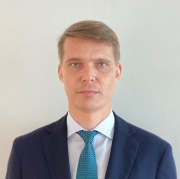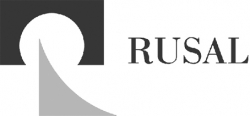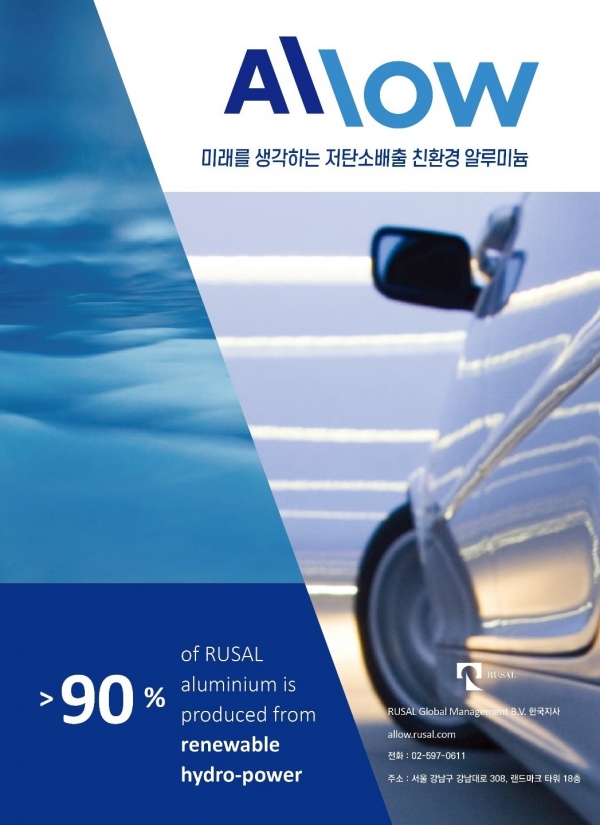"Rusal is Expanding supply capacity and responding to demand for new alloy development with Korean customers".
"Leading to provide low-carbon aluminium solutions to respond to carbon neutrality issues".
Global aluminium smelters are developing technologies for processes with low or zero carbon emissions, and are actively marketing brands for low-carbon aluminium. A typical one is Rusal's 'ALLOW'.
Steel & Metal News asked for global aluminium market trend and marketing strategies to Roman Berstenev, Asia Sales Director of Rusal Marketing GmbH.

Q. Aluminium industry had a traditional oversupply structure, but the supply-demand situation is different this year. Please explain the current situation and future prospects of the global aluminium market.
A. The situation in aluminium market is changing, since 2018 China started the implementation of “supply-side reform”, setting primary aluminium capacity cap at 45Mt and eliminating illegal capacities. Last year China committed to be a carbon-neutral by 2060, accelerating an aluminium demand, attributed to energy transition process. These two factors put Chinese market in a structural primary aluminium deficit, which already exceeds 1Mt and may grow up to 3Mt over next 5 years. Primary aluminium deficit in China turned global aluminium market in a shortage, more primary aluminium capacity should be delivered in the rest of the world in next decade to meet demand growth. Aluminium market is at the beginning of new investments cycleand it should be supported by the price over $2500/mt to make an investment into new smelting capacity attractive. The locations of new capacity are likely defined by an access to low carbon power sources.

Q. Recently, it is known that there are restrictions on the production of primary aluminium due to the shortage of alloying materials such as silicon and magnesium. What is the situation for RUSAL, and will there be any disruptions to global supply this year and next year?
A. The restrictions in production of primary aluminium in China is attributed to a regulation/dual energy control procedure, general power shortage and energy price.
On the top rising of primary aluminium cost of production, power shortage in China affected availability of key alloying elements such as Si and Mg, which are critical for alloys for Automotive, Packaging and Building and Construction applications. With 87% global production share, China has a near-total monopoly on global magnesium manufacturing. The Chinese supply shortfall has already resulted in record prices and worldwide distortions in the supply chain.
China will direct substantially reduced production to its domestic aluminium extrusion and rolled products industries, leaving companies outside of China without requiredvolumes of raw materials to continue production.
In order to secure supply of key alloying elements and perform contract obligations, primary aluminium producer, should pay a price, which is attractive for Chinese suppliers to export these materials. Aluminium alloys producers are already facing substantial cost, which they cannot sustain and have to pass it down the value chain. We may see various cost adjustment mechanism emerging to support growing demand for aluminium alloys, notably for such sectors as electric vehicles, beverage cans, solar PV frames and many others.
Q. Among the global markets, what kind of attractiveness does Korea have? What is the current supply scale and what is the potential for future supply expansion?
A. Korea relies entirely on imports for the supply of aluminium raw materials, and according to the analysis data of related industries, the demand is expected to increase steadily and reach 1.97 million tons by 2025. Globally, the automobile industry, construction, electronics, and packaging industries are rapidly recovering and demand for eco-friendly aluminium products and components continues to rise.Korean market is followingand in some cases leading the trend. RUSAL is expanding production capacity to meet this demand, notably in value added products and by responding to new alloys development needs though joint R&D projects with customers.
Currently, RUSAL is carrying out several joint development projects in the automotive and electronic sectors in Korea, and the demand is expected to increase steadily. We also see good prospective for low-carbon aluminium demand, which RUSAL sells under ALLOW brand.
Q. Beyond simply providing aluminium raw materials, what kind of services and solutions does RUSAL provide to Korean customers?
A. Managing production, shipment and providing excellent customer service to all customers globally is at the heart of work being done by RUSAL. Korea is one of the key markets in Asia with its strong aluminium consumption in various industries, including automotive. RUSAL constantly engages in innovation though R&D projects with Korean customers and partners. Such cooperation brings technical progress in form of new alloys with improved properties and new applications. RUSAL alloys are used in highly specialized automotive sector, making technical support a critical value proposition to customers. Our state-of-the-art equipment at laboratories and experimental casting complex enable analyzing and solving technical problems by our highly skilled technical managers.
RUSAL technical capabilities were further expanded in 2021 with acquisition of Aluminium Rheinfelden and their Alloys division, a leading aluminium cast house in Germany. Rheinfelden is known for its range of proprietary alloys for automotive sector, including Silafont, Castasil etc., which are now part of RUSAL product portfolio.
Q. Globally, 'Carbon neutrality' and 'Low carbon growth' are important issues for all industries. What does 'Carbon neutral' and 'Low carbon growth' mean for the aluminium industry?
A. Aluminium will remain a key sustainable material for the green energy transition in the coming decades. As the aluminium sector strives to remain in line with 1.5-degree scenario, the growth in demand for this sustainable material will need to come unbundled from the growth in greenhouse gas emissions.
Carbon neutrality means net-zero CO2 emissions. Currently, this only is achievable with the use of carbon footprint compensation/neutralization measures. Low-carbon growth of the aluminium industry means maximizing production of primary aluminium with low carbon footprint, development of innovative aluminium smelting technologies and expanding recycling capacities.
Q. We know that RUSAL has an advanced solution for low-carbon aluminium. Please tell us about the solution. Also, what advantages can customers get from this?
A. Since 2017, RUSAL offers customers ALLOW, its proprietary brand of low-carbon aluminium.
It is produced with hydropower and comes with a carbon footprint and energy source statements, traceable to individual smelter, verified by independent auditor.
Using ALLOW enables our customers to supply products to their customers with the confidence that they get low-carbon aluminium with a best-in-class sustainability performance. Externally verified carbon footprint statements provide credible source of Scope 3 emissions assessment. Our aluminium under the brand ALLOW has a CO2 footprint 5 times lower (Scope 1 and 2) than the global average. We are also pioneers in the groundbreaking carbon free aluminium production technology, which will completely eliminate all emissions during the smelting process, replacing CO2 with oxygen. The inert anode technology will be a big step forward for decarbonizing entire industries, which use aluminium in production.
Q. Why is RUSAL so strong in the field of eco-friendly, low-carbon aluminium?
A. RUSAL is the world’s largest producer of low-carbon aluminium with 98% of its electricity sourced through clean, renewable hydropower. RUSAL’s annual capacity to produce low-carbon aluminium is over 3 million tons, which is more than 80% of its total output. RUSAL has increasingly focused efforts on measuring and managing its carbon footprint with the view to better meet market requirements for decarbonization of products across the wide range of applications of aluminium.

Q. I heard that RUSAL is planned to be separated into two separate companies. What is the purpose of the business separation, and how will it proceed?
A. As of now, we are awaiting approval from all shareholders. The proposed demerging will establish clear pathways to implementing different strategies: remaining RUSAL assets post-separation will focus on Net Zero priorities, further promoting its low carbon brand ALLOW, while the new company will concentrate on delivering a longer-term modernization program.
Over the past 10 years, RUSAL has invested heavily in environmental modernization and the construction of new modern production facilities. Improving its environmental profile is a priority across the company's enterprises.
The construction of new capacities and environmental modernization of the new company’s assets solves a whole range of issues. Among other things, this will reduce the carbon footprint of the metal produced.

